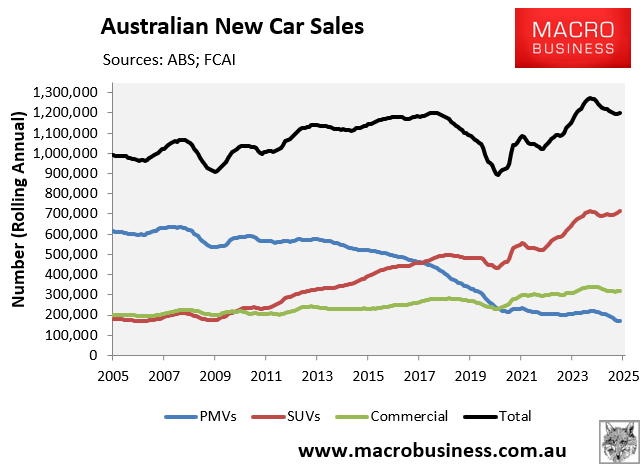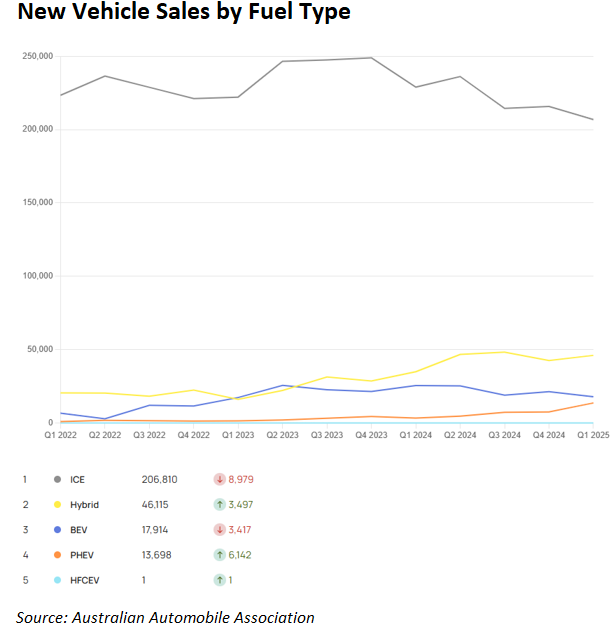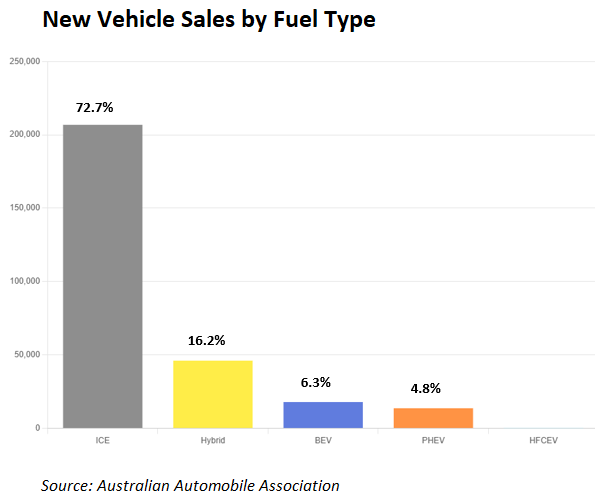Australians want hybrid vehicles, not EVs
The Federal Chamber of Automotive Industries (FCAI) released new car data for July, which reported the strongest monthly sales on record with a total of 103,097 vehicles delivered over the month. This was 3.6% higher than the same month last year.
“We are now seeing confidence return to the market, supported by a recent interest rate reduction and anticipation of further easing”, noted FCAI chief Tony Weber.
“Consumers are responding with interest across most segments, particularly utes and SUVs”.

Indeed, as illustrated above, there were sales of SUVs in the year to July were 713,200 sales of SUVs in Australia, versus just 168,400 passenger vehicles.
“For every two passenger vehicles sold so far in 2025, about nine SUVs have been sold. In July, there was only one sedan in the top 20 models, the Toyota Corolla”, Tony Weber said.
The other strong contrast was between battery electric vehicles (BEVs) and hybrids.
Despite the heavy federal and state subsidies on offer, sales of BEVs have stalled. Only 7,129 battery electric vehicles were sold in Australia in July, comprising just 6.9% of the total Australian market.
So far this year, BEV sales have totalled just 54,364 sales in Australia, down from the 2024 total over the first 7 months of 57,648.
By contrast, sales of hybrids, which are no longer subsidised by taxpayers, are booming.
Sales of plug-in hybrid electric vehicles (PHEVs) have surged by 183% year to date, according to FCAI.
“With more than 50 models available in 2025, plug-in hybrids have emerged as an important transition technology for many Australians, particularly those in regional areas or those with limited access to charging”, Weber said.
“They offer the ability to drive short distances on electric power while retaining the flexibility and range of a conventional engine”.
The latest quarterly data from the Australian Automobiles Association showed that quarterly BEV sales (blue line) peaked in Q2 2023 at 25,696 and were 30.3% lower in Q1 2025:

Over the same period, hybrid sales (yellow and orange lines) have soared and combined roughly triple BEV sales.
BEVs share of total car sales was only 6.3% in Q1 2025, down from 8.7% at the peak in Q2 2023. By contrast, standard hybrids comprised 16.2% of total sales in Q1 2025, with PHEVs at 4.8% (combined 21%).

It is clear that Australians prefer the convenience of hybrids over the inconvenience and range anxiety inherent in BEVs.
The reality is that without generous taxpayer subsidies, the BEV market in Australia would collapse.
There are far better ways to spend scarce taxpayer funds than subsidising private car purchases.
